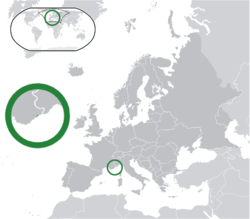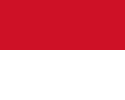
Back Монако Abkhazian Monakô ACE Monaco Afrikaans Monaco ALS ሞናኮ Amharic Monaco AMI Mónegue AN Monaco ANG Mọnako ANN मोनाको ANP
Principality of Monaco | |
|---|---|
| Motto: "Deo Juvante" (Latin) (English: "With God's Help") | |
| Anthem: Hymne Monégasque (English: "Hymn of Monaco") | |
 Location of Monaco (green) on the European continent (green & dark grey) | |
| Capital | Monaco (city-state) 43°44′N 7°25′E / 43.733°N 7.417°E |
| Largest quarter | Monte Carlo |
| Official languages | French[1] |
| Other languages |
|
| Ethnic groups | |
| Demonym(s) |
|
| Government | Unitary parliamentary semi-constitutional monarchy |
| Prince Albert II | |
| Didier Guillaume | |
| Area | |
• Total | 2.08 km2 (0.80 sq mi) |
| GDP (PPP) | 2015 estimate |
• Total | $7.672 billion |
| Currency | Euro (€) (EUR) |
| ISO 3166 code | MC |
Monaco, officially the Principality of Monaco (French: Principauté de Monaco), is the second smallest country in the world after the Vatican City. Monaco is a city-state, meaning that the entire country is just one city.
Monaco is located south-east of France, on the Mediterranean Sea in Western Europe. Monaco's official language is French while the language of Monégasque is also a national language. Monaco's population is around 38,000 but under 10,000 of its citizens are Monégasque nationals.
The currency is the Euro, even though Monaco is not part of the European Union. Monaco is considered a tax haven and is often regarded as one of the wealthiest countries in the world because many rich people live there.
Monaco is famous for the Monte Carlo Casino and the Monte Carlo Opera, is in the north-east of the country. Monaco is also famous for two car races: the Monte Carlo Rally and the Monaco Grand Prix.
- ↑ "Constitution de la Principauté". Council of Government. Archived from the original on 22 July 2011. Retrieved 22 May 2008.

